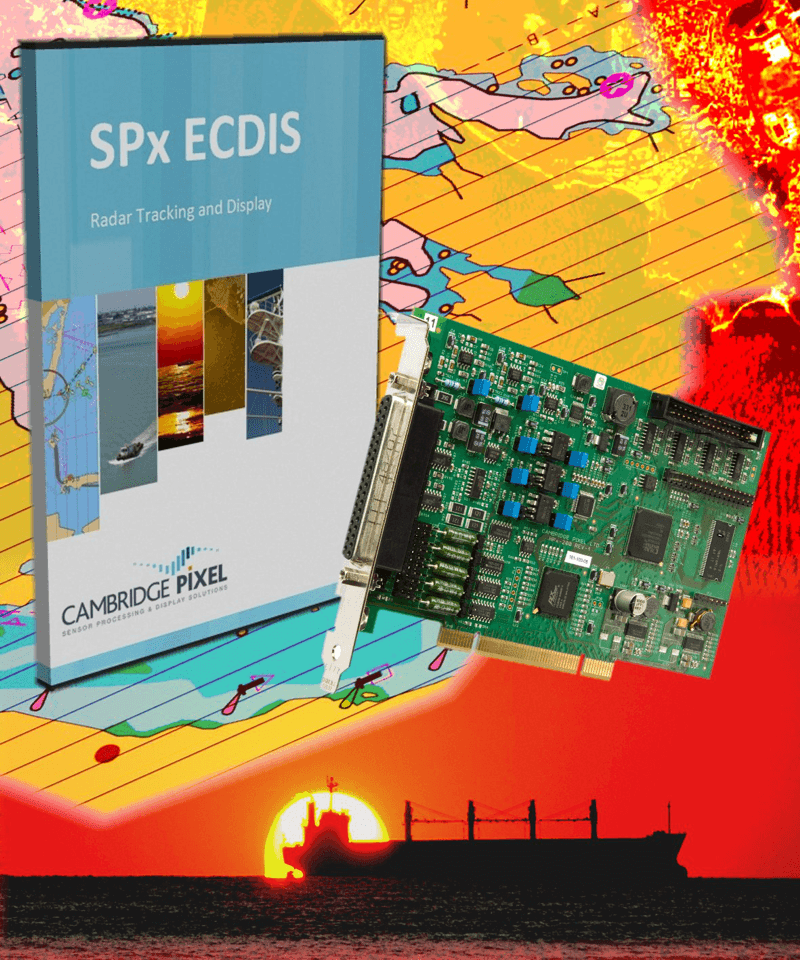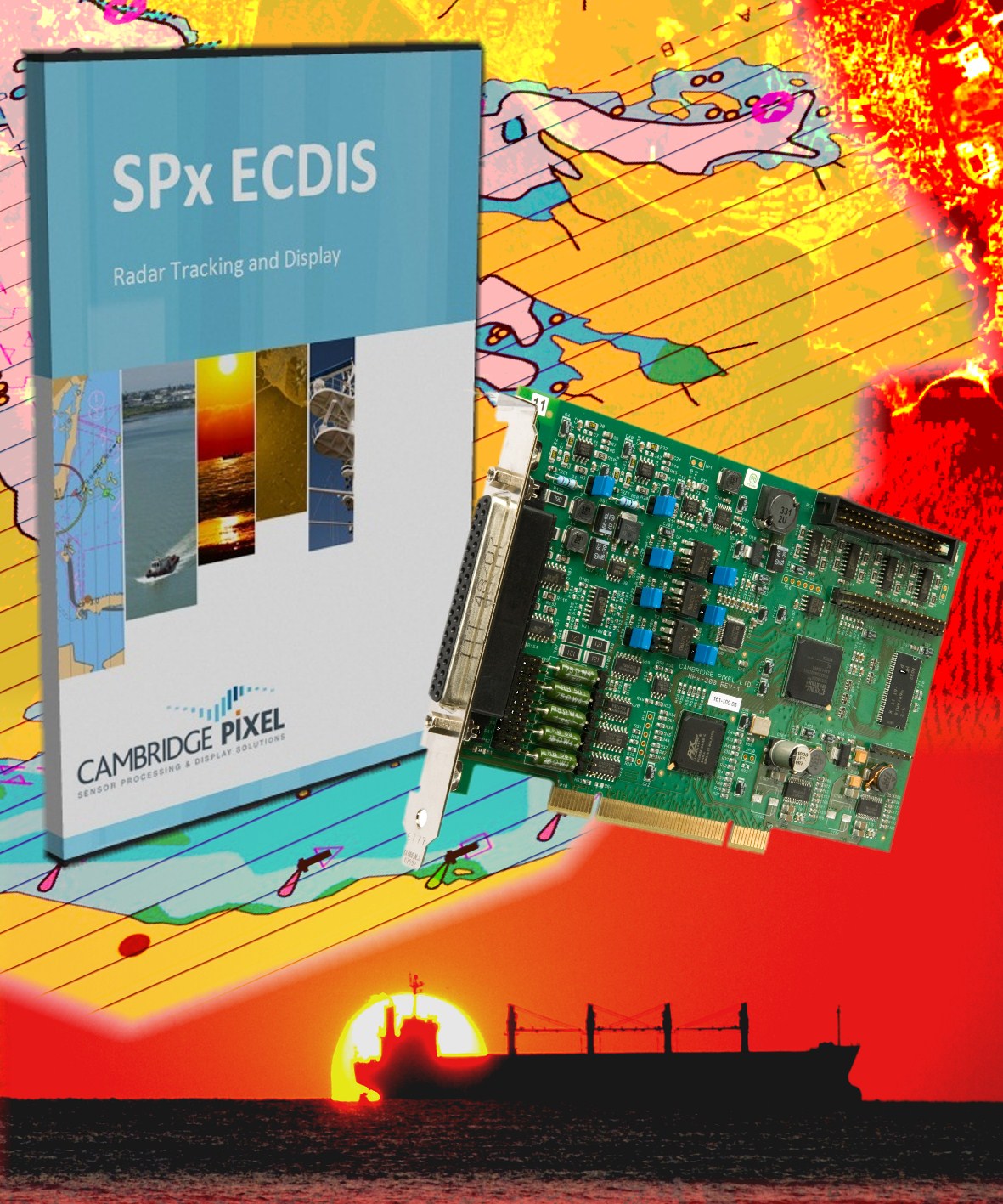- SPx-ECDIS kit to provide systems integrators developing Window-based ECDIS systems with modules for radar interfacing, scan conversion, chart display, target tracking, GPS interface and record/replay functionality
- With SPx-ECDIS toolkit integrators are able to license one or more of Cambridge Pixel's tried and tested, high flexible 'modules-of-expertise' - ideal for in-country ECDIS developers and new entrants looking for low risk market entry point
- ECDIS systems will be mandatory from July 2012 on most large passenger ships, tankers and cargo ships following introduction of new International Maritime Organisation regulations
CAMBRIDGE, United Kingdom, April 3rd, 2012 - Cambridge Pixel (www.cambridgepixel.com), a developer of sensor processing and display solutions, has introduced its SPx-ECDIS radar kit. The new toolkit will allow systems integrators building Windows-based Electronic Chart Display and Information Systems (ECDIS) for commercial ships to add radar interfacing, scan conversion, chart display, target tracking, a Global Positioning System interface and record/replay functionality into their ECDIS solutions.
ECDIS is an approved system which displays information from electronic navigational charts and digital nautical charts and integrates these with other navigational sensors, such as radar, to provide continuous position and navigational safety information.
The introduction of Cambridge Pixel's SPX-ECDIS kit was driven by new International Maritime Organisation regulations which come into force from July 2012. These regulations mandate most large passenger ships, tankers and cargo vessels to integrate digital navigation (ECDIS) into bridge procedures. According to some market estimates, up to 45,000 ships will be required to be fitted with ECDIS between 2012 and 2018.
David Johnson, managing director of Cambridge Pixel, said: "The migration of paper chart navigation to ECDIS navigation - as a result of the regulations - has resulted in a frenzy of activity among the big bridge system manufacturers and suppliers of stand-alone ECDIS systems for the retrofit market.
"Our toolkit - which contains many of the components needed to build a total system - is likely to be attractive to system integrators, particularly those developing a truly localised in-country ECDIS offering but also to any new entrant looking for a low risk way into what is a sizeable market."
Cambridge Pixel's new SPx-ECDIS kit provides considerable flexibility for customers looking to develop a flexible, open-systems ECDIS solution. The radar interface is based on the HPx-200C (for PCI) or HPx-200Ce (PCI-express) card, which provides a highly flexible interface for a wide range of radar signal types.
For radar display, the SPx-ECDIS product includes a powerful radar scan converter, which presents a Plan Position Indicator (PPI) radar display image with fully configurable view, colour, brightness, persistence and trail history. The scan converter provides a range of options for combining the radar with application graphics, allowing for underlay/overlay graphics from navigational charts. For chart display, the ECDIS application can take responsibility for this, leaving SPx-ECDIS to handle the radar, or else SPx-ECDIS can provide a full S57 chart display capability.
The built-in target tracker processes the radar video to extract and follow targets of interest. The acquisition of targets can be manual or fully automatic. The areas of target acquisition can be programmed as latitude/longitude polygons or the software can use a built-in map database to support acquisition of targets at sea, with video returns over land being automatically suppressed. The tracker is fully configurable for a range of target types and applications.
"We have already been approached by systems integrators who are keen to use our building blocks as the basis for an in-country ECDIS solution," added David Johnson. "Our SPx-ECDIS toolkit is appealing as they are not locked in to one supplier and so have the freedom and flexibility to build and customise their own local language ECDIS system to meet the needs of local ship owners."
Cambridge Pixel's SPX-ECDIS kit is part of its world-leading SPx suite of software libraries and applications which provide highly flexible, ready-to-run software products or 'modules-of-expertise' for radar visualisation, radar video distribution, plot extraction and target tracking. Cambridge Pixel's engineering team has decades of experience of developing complex radar and sensor processing and display systems for naval, air traffic control, vessel traffic, security and airborne radar applications.
Media contact:
Martin Brooke (for Cambridge Pixel)
Martin Brooke Associates
Tel: +44 (0) 1223 882174
Email: [email protected]
Found this interesting? Please share it with your network:




